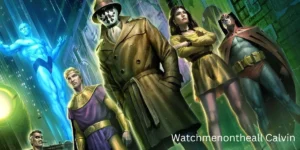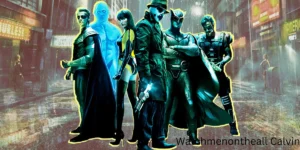WatchmenOnTheAll Calvin: A Comprehensive Analysis of the Impact and Significance
Understanding the Context of WatchmenOnTheAll
It is necessary to give some background information on the “Watchmen” universe before delving into the intricacies of WatchmenOnTheAll Calvin. This universe is based on the well-known comic novel that Alan Moore and Dave Gibbons produced in the 1980s. The story questions the moral complexities of vigilante justice and political intrigue while examining the function of superheroes as social constructs.
A new discussion on the thematic components of WatchmenOnTheAll has surfaced as a result of the narrative’s current revival through multiple adaptations. This suggests that stories that appeal to a modern audience are nevertheless shaped by the sociopolitical context.
The Origin of “Watchmenontheall Calvin”
“Watchmenontheall Calvin” seems to be a combination of symbolic and theological themes. In literary and religious contexts, the phrase “watchmen” is frequently linked to alertness, guardianship, and a sense of obligation. In the Bible, guards are portrayed as those who are responsible for ensuring moral and spiritual order, warning others, and protecting communities.
The term “Calvin” most likely alludes to one of the key players in the Protestant Reformation, John Calvin. Calvin’s theological system, sometimes known as Calvinism, places a strong emphasis on ideas like predestination, divine sovereignty, and personal moral accountability. The phrase “watchmenontheall Calvin” conjures up a powerful picture of spiritual guardianship based on Calvinist ideals, denoting a dedication to moral rectitude and attentiveness.
Watchmen as Guardians of Society
The function of a watchman goes beyond simple observation in both religious and secular traditions. As a bridge between the familiar and the unknown, guards are trusted with the well-being of their communities. They are in charge of anticipating dangers and making sure everyone is ready.
This responsibility is made even more clear in the context of “watchmenontheall Calvin.” Calvinist philosophy places a strong emphasis on individual responsibility and a close relationship to divine will. As a result, a “Calvinist watchman” serves as a moral compass and defender, encouraging people and societies to uphold moral standards.
The Cultural Impact of WatchmenOnTheAll Calvin

As WatchmenOnTheAll Calvin’s story progresses, its effects are seen much beyond the screen, influencing social discourse and behavior. This section will assess the story’s cultural ramifications, highlighting the value of storytelling in promoting awareness and conversation.
1. Promoting Critical Thought
By challenging viewers’ perceptions, WatchmenOnTheAll stimulates critical thinking about current events. Viewers are prepared to face the complexity of the world around them by interacting with concepts like moral responsibility and social justice through Calvin’s journey.
2. Generating Dialogue Around Societal Issues
WatchmenOnTheAll Calvin’s themes encourage discussion of urgent societal concerns like inequality, institutional racism, and environmental crises. The story’s portrayal of the protagonist’s hardships serves as a moving reminder of the value of activism and civic engagement in promoting social change.
3. Fostering Empathy
The Watchmen universe’s capacity to promote empathy is arguably one of its most potent features. Calvin’s persona encourages viewers to appreciate different viewpoints by embodying the hardships and frailties that are fundamental to human existence. WatchmenOnTheAll thus turns into a platform for introspection and interpersonal interaction in addition to being a source of amusement.
The Role of Calvin in WatchmenOnTheAll
Calvin is a key figure in the WatchmenOnTheAll narrative, representing a complex individual who embodies a number of important ideas. We must examine Calvin’s qualities, values, and the events that shape his character arc in order to comprehend his significance.
1. The Complexity of Calvin’s Character
Calvin is presented as a representation of the moral quandaries and contradictions that are innate to humanity. A recurrent motif in the Watchmen universe, his voyage highlights the conflict between personal beliefs and social expectations. Because of his complexity, he is a relatable character who encourages viewers to consider their own moral limits as they identify with his struggles.
2. Societal Reflection
Calvin’s experiences offer a moving commentary on the contemporary world, highlighting the difficulties experienced by people juggling personal beliefs, identity conflicts, and societal injustices. WatchmenOnTheAll addresses important topics like political monitoring, societal inequality, and the obligations that come with authority through Calvin.
Theological Implications of “Watchmenontheall Calvin”
The fundamental ideas of Calvinism offer a rich context for understanding “watchmen on the all Calvin.” One of the main tenets of Calvinism is predestination, which emphasizes the idea that God has already decided each person’s destiny. This idea gives the role of guards a special depth. The guard’s job may change from changing the course of events to making sure people stay in line with God’s plan if the results are predetermined by God.
Furthermore, human behavior is highly valued as a mirror of God’s will due to Calvinism’s emphasis on God’s sovereignty. Within this concept, a watchman becomes an agent of God’s sovereignty, encouraging spiritual discipline and a sense of accountability in their community. Thus, “Watchmenontheall Calvin” depicts a complex interaction between heavenly direction and personal accountability.
Themes Explored in WatchmenOnTheAll Calvin
A number of topics that capture the breadth of human experience surface in WatchmenOnTheAll. Examining these topics helps one appreciate Calvin’s story’s depth and applicability.
1. Justice and Morality
The Watchmen universe revolves around the central theme of justice, and Calvin’s trip deepens this investigation. Viewers are forced to consider their own conceptions of justice as they struggle with the moral ramifications of their choices. This analysis explores the philosophical questions of right and wrong and the ensuing repercussions, going beyond simple behavior.
2. Power and Responsibility
The connection between authority and accountability is another important issue in WatchmenOnTheAll Calvin. Calvin’s persona emphasizes the vital significance of accountability in a society where those in positions of authority frequently misuse their influence. His triumphs and setbacks are used as plot points to remind viewers of the significant influence that individual decisions have on broader social structures.
3. Identity and Relationship Dynamics
Calvin’s character is greatly influenced by his identity, which is intricately linked to his connections. The intricacies of contemporary culture are reflected in the examination of interpersonal relationships and what it means to establish connections in a fractured world. Viewers are prompted to consider their relationships and the part identity plays in forming bonds through Calvin’s interactions.
Key Features and Offerings of watchmenontheall calvin
1. In-depth Reporting
The platform’s hallmark is its commitment to thorough reporting. Every article, video, or podcast is the product of meticulous research and fact-checking. This commitment to accuracy and depth sets WatchmenOnTheAll Calvin apart in an era where fast news often sacrifices substance for speed.
2. Community Engagement
WatchmenOnTheAll Calvin thrives on collaboration and interaction. It actively encourages its audience to share insights, engage in debates, and contribute ideas. This two-way relationship fosters a sense of community and trust, enhancing the platform’s credibility.
3. Multimedia Integration
Understanding the power of varied media, the platform delivers content in multiple formats. From podcasts and infographics to interactive timelines and video documentaries, it caters to different learning styles and preferences.
4. Educational Resources
Beyond news, the platform offers valuable educational content. This includes step-by-step guides, expert interviews, and resource hubs designed to empower users with actionable knowledge on topics such as activism, environmental conservation, and technology ethics.
Modern Interpretations and Applications

“Watchmenontheall Calvin” speaks to the topics of moral rectitude, leadership, and alertness in today’s conversation. It illustrates the ubiquitous need for those who can serve as moral compass points when things get unclear. The symbolic guards serve as a reminder of the value of clarity and stability in a time of moral uncertainty and rapid change.
- Leadership and Governance: By accepting positions that put the welfare of their communities first, leaders might take a cue from the idea of “watchmenontheall Calvin.” The values of accountability and vigilance are timeless, whether in business, politics, or social advocacy.
- Spiritual Guidance: “Watchmenontheall Calvin” may be especially appealing to theologians and religious leaders since it captures the twin duties of doctrinal observance and spiritual care.
- Personal Responsibility: On a personal level, the term encourages reflection. It pushes people to think about their responsibilities as stewards of moral and ethical principles in their communities.
Historical Parallels of watchmenontheall calvin
There is a long history of the watchman’s job. Guards have represented tenacity and insight in both ancient city-states and contemporary communities. It is possible to see John Knox and other reformers in Calvinist history as spiritual guardians working to maintain social and theological change.
Similar to this, the metaphor has been used in literature and art to convey the conflict between alertness and inevitable fate. For example, guards are commonly used as symbols of conscience and forewarning in Shakespeare’s plays. Through the juxtaposition of Calvinist theology with the ageless watchman figure, “watchmenontheall Calvin” unites spiritual and historical themes.
Challenges and Critiques
“Watchmenontheall Calvin” has problems even though it has a lot of philosophical weight. Critics may contend that the deterministic elements of Calvinism can erode a guard’s proactive duty by fostering a sense of fatalism. Furthermore, there is ongoing debate in theological circles regarding how to strike a balance between human agency and divine sovereignty.
Some might wonder if this idea is still relevant in a pluralistic society. Do “watchmenontheall Calvin” ideals have a strong Calvinist foundation, or may they transcend religious boundaries? These queries encourage more research and discussion.
Cultural Relevance of watchmenontheall calvin
The versatility of “watchmenontheall Calvin” is what makes it so popular. Its ideas of moral responsibility, spiritual grounding, and awareness are applicable in a variety of settings. The phrase provides a flexible touchstone for examining basic human concerns, from interfaith dialogues to training on ethical leadership.
Lessons for Modern Watchmen
Modern spiritual leaders can learn a lot from Calvin’s legacy as a watchman on the wall. Vigilant watchmen are more important than ever in a society full of distractions and conflicting beliefs. Calvin’s life serves as a reminder that a spiritual leader’s job is to truly share the truth and tend to the souls entrusted to them, not to gain favor or provide solace.
Calvin’s devotion to Scripture, his bravery in facing difficulties, and his pastoral heart are all examples that contemporary watchmen might learn from. Being tasked with raising the alarm, protecting the faithful, and warding off spiritual threats is a holy trust that calls for humility and conviction.
Conclusion: Watchmenontheall Calvin
WatchmenOnTheAll Calvin, which combines insightful societal commentary with nuanced character development, is an essential work of modern media. Audiences are encouraged to examine the complexities of justice, morality, identity, and their connections to more general societal issues through Calvin’s vision.
It is certain that WatchmenOnTheAll Calvin will continue to play a significant role in the cultural dialogue as debates surrounding these issues develop, promoting empathy and critical thinking in a society that is changing quickly. WatchmenOnTheAll Calvin is a potent reminder of the influence that storytelling may have on our comprehension of our own humanity in a time when art both reflects and critiques society.
FAQs: Watchmenontheall Calvin
Q: What does “watchmenontheall Calvin” mean?
The phrase emphasizes accountability and divine sovereignty by fusing Calvinist theology with the idea of watchmen—figures of vigilance and moral duty.
Q: Is “watchmenontheall Calvin” a historical term?
Even though it is not a historical term, it makes extensive use of historical and theological ideas, especially those that have their roots in Calvinist philosophy and the biblical role of guards.
Q: How is “watchmenontheall Calvin” relevant today?
The idea applies to a variety of social and private circumstances since it aligns with contemporary leadership principles, ethical integrity, and spiritual foundation.
Q: Does “watchmenontheall Calvin” suggest predestination?
Calvinist concepts of predestination are incorporated, but personal responsibility in conformity to moral and divine standards is also emphasized.
Q: How can individuals embody the role of a “watchman” in their lives?
People can play the metaphorical role of a guard in several ways by remaining watchful, upholding moral principles, and helping their communities.

